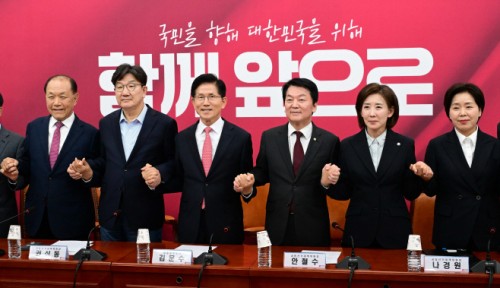 |
| People Power Party presidential candidate Kim Moon-soo (center) holds hands with his joint campaign co-chairs ahead of a Central Election Committee meeting at the National Assembly on April 11. From left: Hwang Woo-yea, Kweon Seong-dong, Kim Moon-soo, Ahn Cheol-soo, Na Kyung-won, and Yang Hyang-ja. / Photo by Lee Byung-hwa |
On April 12, People Power Party presidential candidate Kim Moon-soo announced his "Top 10 Pledges" ahead of the June 3 early presidential election, focusing on economic revitalization, job creation, artificial intelligence, youth housing, express rail expansion, and national security.
The first pledge centers on creating “a business-friendly nation and a vibrant economy through job creation.” Key measures include lowering corporate and inheritance tax rates, reforming the 52-hour workweek through labor-management consensus, and streamlining regulations. Drawing from his experience attracting a massive semiconductor plant to Pyeongtaek as Gyeonggi governor, Kim vowed to stimulate investment and employment by overhauling tax policy and cutting industrial electricity costs.
The second pledge aims to elevate Korea into one of the top three nations in AI and energy. It includes full-cycle investment in AI, nurturing 200,000 specialists, and establishing a 100 trillion won public-private fund to foster global AI unicorns.
Kim also promised to immediately convene a U.S.-Korea summit upon taking office to negotiate a “tariff package” and to institutionalize presidential-led export promotion meetings.
For young voters, he proposed the “3-3-3 Youth Housing Plan,” which would provide housing support for nine years—three years each upon marriage, the birth of a first child, and a second child. The plan includes the annual construction of 100,000 youth housing units.
On transportation, Kim laid out a nationwide expansion of the GTX (Great Train Express), pledging to complete lines A, B, and C during his term and to begin construction on lines D, E, and F. He also pledged to support extensions of existing routes.
To bolster the middle class, he pledged inflation-adjusted income tax brackets, expanded ISA tax benefits, and permission for spot bitcoin ETFs. On real estate, Kim vowed to reform the comprehensive real estate tax and abolish the reconstruction excess profit recovery system.
In welfare, he pledged increased support for pregnancy and childcare, expanded elderly and disability care, and a complete overhaul of the healthcare system within his first six months—reexamining the Yoon Suk-yeol administration’s health reform initiatives from scratch.
Most Read
-
1
-
2
-
3
-
4
-
5
-
6
-
7





















